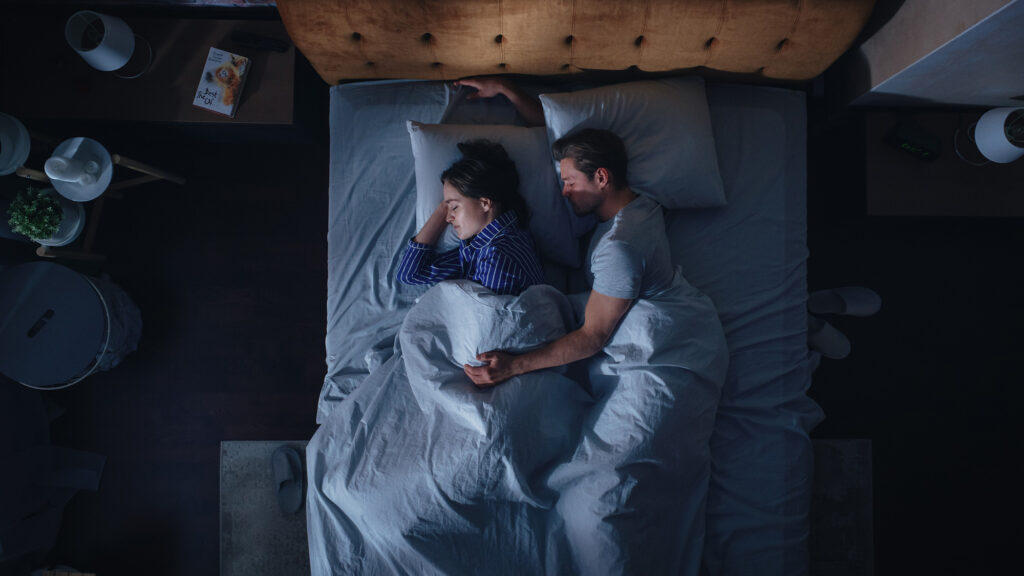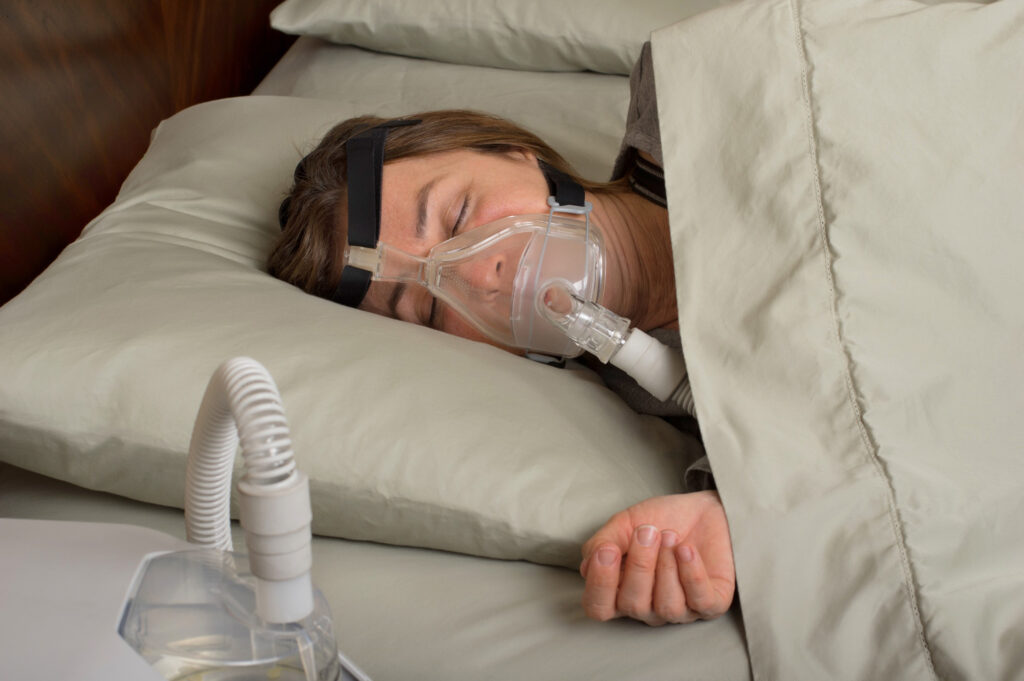How does Good Sleep Lead to Good Looks?
It may have long been considered an old wives’ tale where young men and women were told to get their ‘beauty sleep’ or ‘beauty rest’. And while it’s obvious that days without good sleep can make us look and feel less attractive – crankier in mood, and tired in appearance – there is plenty of scientific evidence and biological factors to prove this myth is truth. So let’s dig a little deeper into the facts surrounding this proven theory.
- First, how does poor sleep affect your appearance?
- Second, how does good sleep improve many aspects of your physical health and even weight loss/gain?
- Third, when you feel good, you look good and vice versa, so how does poor sleep affect your mood and your overall confidence?
- Fourth, how can CPAP therapy aid in getting your beauty sleep?
Science Proves the Myth of Beauty Sleep

A 2010 Swedish Study published by BMJ investigated whether sleep deprived people are perceived as less healthy, less attractive, and more tired than after a normal night’s sleep. Their findings:
“Sleep deprived people were rated as less healthy (using visual analogue scale scores) more tired, and less attractive than after a normal night’s sleep. The decrease in rated health was associated with ratings of increased tiredness and decreased attractiveness. This suggests that humans are sensitive to sleep related facial cues, with potential implications for social and clinical judgments and behavior.” [READ STUDY]
– BMJ
…
A 2013 study published by AASM found that sleep deprivation affects facial features such as the eyes, mouth and skin, and these features function as cues of sleep loss to other people. Their findings:
“Results show that the faces of sleep-deprived individuals were perceived as having more hanging eyelids, redder eyes, more swollen eyes and darker circles under the eyes. Sleep deprivation also was associated with paler skin, more wrinkles or fine lines, and more droopy corners of the mouth. People also looked sadder when sleep-deprived than after normal sleep, and sadness was related to looking fatigued.”
– AASM
…
A 2021 study published by Science Direct studies the impact of sleep restriction on skin parameters and facial appearance of 24 women. Their findings:
“Our survey shows that even a sleep restriction lasting two nights can significantly affect hydration, trans-epidermal water loss, reduced extensibility and elasticity, delayed extensibility, oxidation (MDA), and acidity (pH) of facial skin. Moreover, using photography, we observed a significant related decrease in brightness and saturation, as well as an increase in dark circles under the eyes at two moments of the day (morning and afternoon). This report demonstrates that there is a physiological impact of sleep debt on skin in humans that changes facial appearance, which may potentially interfere in human relationships and social behavior.” [READ STUDY]
– Science Direct
…
A 2022 study published by NIH explored the topic of how sleep deprivation affected weight loss and weight loss management. Their findings:
“Disturbed sleeping patterns, in terms of both quantity and quality, have been documented to lead to an increase in energy intake, mainly from snacking, especially on foods rich in fat and carbohydrates. The relationship between sleep and weight loss seems bi-directional, and although studies up to date use different intervention protocols and/or outcome measures, there is an evident dysregulation of the neuroendocrine appetite control system during sleep deprivation that alters the metabolic rate, with a negative impact on weight maintenance or weight loss interventions.” [READ STUDY]
– NIH
How does sleep affect your beauty (physical appearance)?

“Get at least eight hours of beauty sleep; nine if you’re ugly.”
– Betty White
Let’s state the obvious, when you are tired and/or sleep deprived, you can just look in the mirror to see the differences: less color in your cheeks and face, puffy eyelids, dark circles under your eyes, increase of fine lines and wrinkles, some may even notice dry skin or acne. Stress creates a whole whirlwind of negative results in our minds and bodies, but the stress induced by lack of sleep can cause us to feel rundown and irritable, thus our mental health and outlook on life is affected. We are less likely to smile, less focused and more likely to be irritable. All of which affects how others see us. But there’s more to it than that. Sufficient sleep is restorative and thus offers many benefits for your outer and inner beauty:
Slows down the aging process:
A 2010 study done by UCLA researchers discovered that just a single night of insufficient sleep can make an older adults’ cells age quicker. And consistent insufficient sleep can cause a host of diseases including multiple sclerosis, heart disease and cancer to mention just a few of them.
“Our data support the hypothesis that one night of not getting enough sleep in older adults activates important biological pathways that promote biological aging,”
– Judith Carroll, PhD, UCLA Cousins Center for Psychoneuroimmunology
Gives your body and skin time to heal:
How? Skin cell regeneration is the process during deep sleep, when your body repairs itself through processes like skin cell regeneration. The hormone somatotrophin, also known as human growth hormone, is released during sleep to help with this process.
Increases Blood Flow:
Consistent sleep of at least 8 hours per night reduces physical signs of exhaustion (darkness, bags under the eyes, pale skin, wrinkles and fine lines). Your skin has increased blood flow at night, which can help repair damaged skin and increase body temperature. Lack of sleep can lead to stress, which can cause breakouts, inflammation, and an increase of the stress hormone cortisol, which can also damage your skin.
Reduces Inflammation:
While you sleep, your immune system releases cytokines, which are small proteins that help your body fight inflammation, infection, and disease. Sleep reduces inflammation. How? One theory on why this happens is focused on how blood vessels react while the body is at rest. During sleep, blood pressure drops and blood vessels relax. When sleep is restricted, blood pressure doesn’t decline as it should, which could trigger cells in blood vessel walls that activate inflammation. Another theory has to do the glymphatic system:
“A sleep shortfall interferes with the normal function of the brain’s housecleaning system, termed the glymphatic system (not to be confused with the lymphatic system in the rest of the body). In the deepest sleep phases, cerebrospinal fluid rushes through the brain, sweeping away beta-amyloid protein linked to brain cell damage. Without a good night’s sleep, this housecleaning process is less thorough, allowing the protein to accumulate — and inflammation to develop.”
– Harvard Medical School
Improves Weight Management and Weight Loss

Many find it difficult to loss weight or manage continued weight loss, resulting in a multibillion-dollar industry of weight loss programs, dietary supplements, weight loss medications, gym memberships, exercise routines, dieticians, health coaches, meal plans, fad diets, and a host of weight loss foods, shakes and beverages. But not much is discussed about the correlation between good sleep and weight loss. How does sufficient sleep affect your weight? It’s an exhaustive cycle of cause and effects.
First, sufficient sleep is essential to regulating the hormones that affect hunger and appetite. So when you’re well-rested, you’re eating less. Why? When deprived of sleep, your hunger increases often leading to unhealthy food choices (high carbohydrate, high sugar, greasy or fatty foods). Sleep affects two hormones that affect appetite: Ghrelin which signals hunger to the body and increases when sleep deprived; and Leptin which signals fullness to the body, and this decreases when sleep deprived. So that’s a double whammy which could lead to a double order on the fast-food menu.
Second, good sleep can increase your metabolism, making it easier to burn the calories of the foods you eat during the day. When you sleep, your metabolism slows down about 15% and it can reach it lowest point during the morning, allocating resources for cell repair instead. On the other hand, sleep deprivation can also slow down metabolism while you’re awake, affect energy levels, and also impair glucose metabolism increasing the risk of diabetes. The more hours of wakefulness, the more energy you will expend, thus increasing the amount of food consumed in the day.
Third, good sleep increases energy levels, so you have more energy to walk, run, swim, bike or exercise, which is essential in maintaining weight loss and overall health. And the bonus of regular exercise is that it improves sleep quality, especially if that exercise involves natural light. Researchers say even taking a short walk during the day can improve sleep, but “engaging in at least 150 minutes of moderate-intensity or 75 minutes of high-intensity exercise per week can improve daytime concentration and decrease daytime sleepiness.” – SleepFoundation.org
Fourth, the link between obesity and sleep is well researched, even if the direct cause is unknown. Studies show that adults and children getting 6 or less hours of sleep at night are more likely to be diagnosed as obese. What is not known is the cause and effect, meaning which came first – the sleep issues or the obesity? The physical effects of obesity can increase occurrence of sleep apnea, snoring, depression and insomnia. On the other hand, poor sleep leads to weight gain because of decreased metabolism, lower energy levels and increased appetite. It’s not clear if getting less sleep is the cause of obesity, or if obesity is causing the participants (in these studies) to get less sleep, or perhaps a mix of both. Either way improved sleep is only going to contribute positively to your weight loss efforts.
Fifth, sleep improves mood, outlook, confidence and motivation which are all essential to starting and sticking to a weight loss or weight management plan. With a combination of healthy sleep habits, regular physical activity, avoiding heavy meals before bed can both improve sleep quality and weight management.
How CPAP Therapy Can Contribute to a Beautiful Mind, Heart and Body

CPAP usage increases the quality of sleep so thus contributes to your physical, mental and overall wellbeing, and that’s a beautiful thing!
While sleeping with a mask on may be a little awkward and cumbersome at first, and while you are not going to be inclined to prance any cat walks while wearing one, your appearance can be greatly improved from CPAP compliance in just a few of months of treatment. See what one study showed:
“Patients with obstructive sleep apnea are perceived to appear more alert, more youthful, and more attractive after adherent use of positive airway pressure.”
– NIH Study, The Face of Sleepiness: Improvement in Appearance after Treatment of Sleep Apnea
The above study took pictures before and after, and with improved sleep came a decrease in forehead surface volume, and less redness under the eyes and cheeks.
Another study found that “sleep deprivation included hanging eyelids, red and swollen eyes, dark circles under the eyes, paler skin, more wrinkles, and drooping corners of the mouth.”
– Sleep Journal Cues of Fatigue: Effects of Sleep Deprivation on Facial Appearance.
That’s why they call it Beauty Sleep! And it will not only improve your facial appearance but your mood and what is more beautiful than a calm, happy and well-rested soul?
Sleep is Nature’s Best Make-over
Healthy sleep is important for cognitive functioning, mood, mental health, and cardiovascular, cerebrovascular, and metabolic health. And a healthy person is beautiful inside and out. There is a significant need for greater emphasis on sleep health in education, clinical practice, inpatient and long-term care, public health promotion, schools and the workplace.
Everything CPAP is Idaho’s number one CPAP supply company, located in Boise and servicing the entire Treasure Valley area. At Everything CPAP, we understand how serious of a problem untreated sleep apnea can be for your health. That is why we are doing our part through patient, adding informative content to our website, blog and social media channels, as well as advocating for the sleep health of all of our Idaho neighbors.
If you’re unsure whether you are at risk of obstructive sleep apnea, take our informal sleep screening quiz or call our office:








